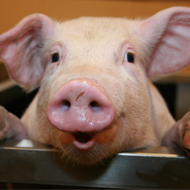
BPEX offers guidance to avoid "Crippling production diseases"
Pig farmers are being urged to make sure they have strong biosecurity measures to reduce the risk of "crippling production diseases" from livestock lorries.
BPEX, the pig levy payers organisation for England, said farmers need to follow simple steps such as operating a zero tolerance policy for poorly washed livestock vehicles attempting to enter their unit.
They should also provide disinfectant wheel dips and foot dips at the entrance and ensure drivers do not enter pig areas of the unit.
Helen Clarke of BPEX said: “Livestock vehicles can be a common factor in the spread of crippling production diseases such as swine dysentery, as well as exotic diseases such as African swine fever and PEDv.”
Eddie Harper of the Livestock Hauliers Association says: “Hauliers, producers and abattoirs must continue to work together to ensure they understand the risks and the key measures to reduce them.
"We also need to ensure we have the proper facilities and equipment in place to clean and disinfect vehicles effectively at every stage of the pig supply chain.”
Many of the same biosecurity measures apply to delivery vehicles such as feed suppliers.
Pig producers can download the factsheet, Action for Productivity no. 43: Lorry biosecurity, from www.bpex.org.uk



 HMRC has invited feedback to its communications regarding the employment status of locum vets and vet nurses.
HMRC has invited feedback to its communications regarding the employment status of locum vets and vet nurses.